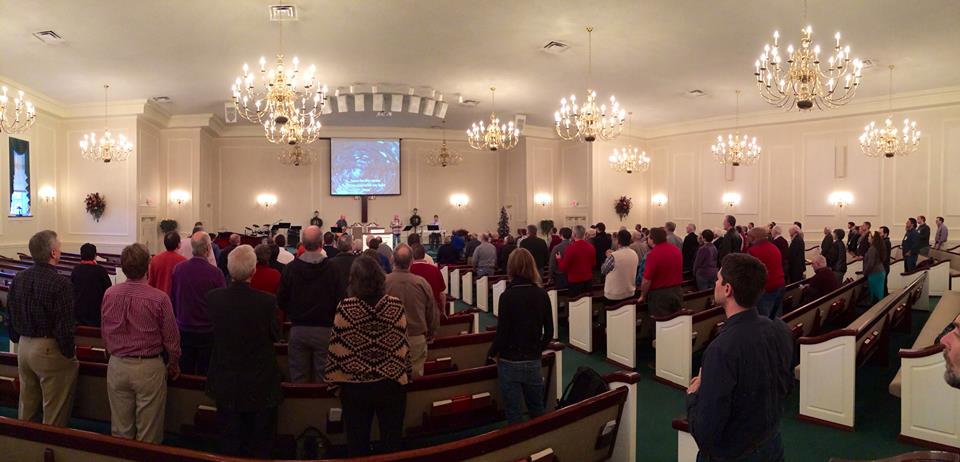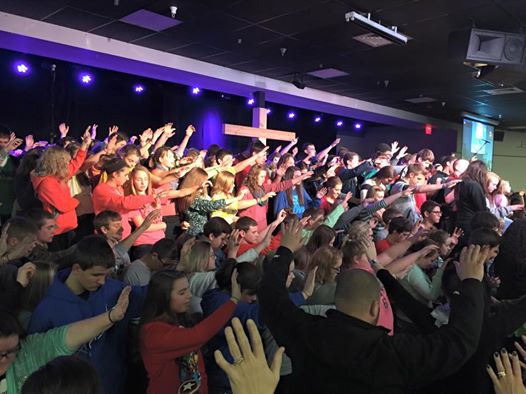There is an important distinction to be made. Revive Indiana is a vessel, an organization with leaders who are a vehicle that God is using to change our community. The excitement and energy that is currently focused around this organization does not negate the way God is already at work in many others places, both inside and outside the local churches in our community. The level of involvement a pastor or congregation has with Revive Indiana is not a sign of how faithful and true they are. The outpouring and blessings of God are not constrained by human designs and plans.
At the same time, something is clearly happening in a powerful way. What is making this work? I believe it is the coming together of the favor of God through the commitment to very specific acts of obedience. Ultimately, this "works" because God is at work. It is as if God has simply said, "It's Time!" to our community. The reports of healing, commitment to Christ, the openness to disruption and life change are not a result of human power.
For me personally, it feels like the story of the man who went to the hardware store to buy a chainsaw. He asked the worker for a good saw, and selected one of the most powerful and largest models they had in the store. He purchased it and went home, but was back the next day. "This is a terrible saw, I've hardly made any progress and I've been working for hours on one small tree." The worker took the saw from him, pulled the starter cord, and the saw roared to life. Startled, the customer jumped back and said, "What's that noise?" After years of trying to use a chainsaw that wasn't running, it feels like the power has been turned on.
There are four specific acts of obedience that I see as being critical to this continued favor. The first is the willingness to put the work of God's activity through the Holy Spirit, grounded in scripture, at the center of daily discernment. The Revive Indiana leaders ask us to Love - Listen - Discern - Respond in every encounter. I see them exemplify this in the pattern of their own lives.
The second is the humility of gathering with others that help us cross denominational boundaries within the church. Churches are coming together, not as a rejection of the local churches, but for the purpose of unifying together in prayer and seeking the guidance of the Holy Spirit for this community.
The third is the faithfulness of simply going out each day in teams to pray for others. About ten years ago I gathered with several groups of church leaders that would read and reflect on Luke 10, the passage where Jesus sent out the 72 to share the good news with others. We did this every time we met for several years, and not once did I make it a point to actually go and do what the passage invited me to do. We are now doing this. On Saturday, 400 gathered to form 100 teams and pray for others. This was not about promoting a local church or Revive Indiana, it was about encounters with Jesus.
The fourth act of obedience is to eat together. In Acts, the table of fellowship is not just about communion, but also about the nature what it means to be connected with each other around an open table. Breakfast, lunch and dinner for six days of the week form the core of these places of connection as the gathered church. Revive Indiana and the local churches have partnered together to make this a reality for 52 days. This comes at tremendous cost and sacrifice with no dramatic appeal for donations to cover costs. It is simply the church being the church together.
-John M Troyer
If you haven't yet been present for any Revive Indiana events, I invite you to come and check them out.
Monday - Thursday
7:00am – Prayer time at Maple City Chapel (2015 Lincolnway E, Goshen, IN 46526)
8:00am – Breakfast at Maple City Chapel
9:00am – Organize into teams and Go Out to pray for churches
12:00pm – Noon time Prayer
Monday – First Baptist Church Elkhart 53953 County Road 17, Bristol, IN 46507
Tuesday – Nappanee Missionary Church 70417 State Road 19 North, Nappanee, IN 46550
Wednesday – Brenneman Missionary Church 61115 Indiana 15, Goshen, IN 46528
Thursday – Faith Mission 801 Benham Ave., Elkhart, IN
1:00pm – Lunch
2:00pm – Organize into teams and Go Out to pray for people
Monday - Thursday
5:30pm – Supper at Maple City Chapel (2015 Lincolnway E, Goshen, IN 46526)
7:00pm – Evening Prayer and Worship at Maple City Chapel
Friday
7:00am – Prayer time at Maple City Chapel (2015 Lincolnway E, Goshen, IN 46526)
8:00am – Breakfast at Maple City Chapel
9:00am – Organize into teams and Go Out to pray for churches
12:00pm – Noon time Prayer at River of Life Fellowship (11162 Indiana 120, Middlebury, IN 46540)
1:00pm – Lunch
2:00pm – Organize into teams and Go Out to pray for people
5:30pm – Supper at Clinton Frame Mennonite Church (63846 County Road 35, Goshen, IN 46528)
7:00pm – Training at Clinton Frame Mennonite (nursery through 3rd grade)
Saturday
7:00am – Prayer time at Clinton Frame Mennonite Church (63846 County Road 35, Goshen, IN 46528)
8:00am – Breakfast at Clinton Frame Mennonite Church
9:00am – Organize into teams and Go Out to pray for churches
12:00pm – Noon time Prayer at Calvary Assembly of God (1010 East Mishawaka Road, Elkhart, IN 46517)
1:00pm – Organize into teams and Go Out to pray for people
2:00pm – Lunch (out in the community with your team)
5:30pm – Supper at Clinton Frame Mennonite Church (63846 County Road 35, Goshen, IN 46528)
7:00pm – Evening Worship at Clinton Frame Mennonite (reviveKIDS and nursery)
Sunday
Worship at your local congregation and celebrate what God has done
Rest






 RSS Feed
RSS Feed
